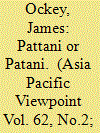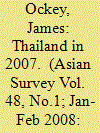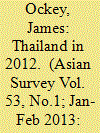|
|
|
Sort Order |
|
|
|
Items / Page
|
|
|
|
|
|
|
| Srl | Item |
| 1 |
ID:
101923


|
|
|
|
|
| Publication |
2011.
|
| Summary/Abstract |
Studies of the formation of national identity have highlighted the importance of national pilgrimages, akin to sacred religious pilgrimages. However, less attention has been paid to the effect of religious pilgrimages on national identities. In this article, I examine the ways that religious pilgrimages have shaped identities in the Jawi community, particularly early in the twentieth century, when nationalism spread through Southeast Asia. Given the deeply personal nature of pilgrimages, I do this primarily through an exploration of the religious pilgrimage and later life of one well-known leader from Pattani, Haji Sulong Abdulkadir al-Fatani. I find that this approach leads to a more nuanced consideration of the ways that plural identities, even conflicting plural identities, are often held by individuals.
|
|
|
|
|
|
|
|
|
|
|
|
|
|
|
|
| 2 |
ID:
064900


|
|
|
| 3 |
ID:
180643


|
|
|
|
|
| Summary/Abstract |
The conflict in Southern Thailand has claimed over 7000 lives in the last 15 years, with no end it sight. The Thai state has consistently misinterpreted both the causes and the solutions to the problems. This article seeks to identify one cause for the conflict, through examining identity in the south through the lenses of collective memory and forgetting. By focusing on young activists at university, it demonstrates the ways that collective memory is generated through shared pilgrimages to sacred places, and shared activities in the pursuit of peace. It also explores the ways that shared memory is both created through debate, through sharing and even through hate speech on the internet, and discusses the ways that social media debates deepen collective memory in oppositional and dangerous ways. Finally, the article argues that until a place is found for local collective memories of Patani in the Thai national collective memory, long-term peace will be impossible.
|
|
|
|
|
|
|
|
|
|
|
|
|
|
|
|
| 4 |
ID:
081830


|
|
|
|
|
| Publication |
2008.
|
| Summary/Abstract |
The year 2007 marked a return to parliamentary rule in Thailand, with a new Constitution approved in August and elections in December. With democracy, some fear the return of popular former Prime Minister Thaksin Shinawatra, overthrown in the coup of 2006. Attempts by the coup group to contain Thaksin's influence continued throughout the year.
|
|
|
|
|
|
|
|
|
|
|
|
|
|
|
|
| 5 |
ID:
119098


|
|
|
|
|
| Publication |
2013.
|
| Summary/Abstract |
In 2012, Thailand continued to take steps toward the creation of a new normal. That new normal encompassed, not always successfully, reconciliations between Red and Yellow adherents, the government and the military, the government and the courts, factions in the Pheu Thai Party, and between the government and Southern insurgents. By year's end, some normalcy had been achieved, although the future of Thaksin, reconciliation between the colors, and the violence in the South remained unresolved.
|
|
|
|
|
|
|
|
|
|
|
|
|
|
|
|
| 6 |
ID:
130183


|
|
|
|
|
| Publication |
2014.
|
| Summary/Abstract |
The Thai government in 2013 faced numerous challenges: a gradual decline in popularity, continuing insurgency in the South, problems with the economy and economic strategy, and difficult relations with the military. These challenging issues on the agenda led to widespread demonstrations and intractable conflict by the end of the year.
|
|
|
|
|
|
|
|
|
|
|
|
|
|
|
|
| 7 |
ID:
172468


|
|
|
|
|
| Summary/Abstract |
In 2019, Thailand held its first election in eight years, crowned a new king for the first time in nearly 70 years, and hosted the ASEAN summits for the first time in a decade. It was an eventful year for Thailand, filled with controversy and attempts to restore stability and the democratic legitimacy lost after the coup of 2014. Progress was marred by missteps and irregularities, leaving both stability and legitimacy in doubt.
|
|
|
|
|
|
|
|
|
|
|
|
|
|
|
|
| 8 |
ID:
179249


|
|
|
|
|
| Summary/Abstract |
In 2020, attention in Thailand focused on the pandemic and on political protest. After some early missteps Thailand managed the pandemic well, eliminating community transmission with a strong curfew, essentially a lockdown, and effective tracking and tracing. Yet the economic impact on Thailand’s tourism-dependent economy will continue into 2021. The pandemic interrupted student-led protests against a regime they considered undemocratic, in the wake of the dissolution of the opposition Future Forward Party. After the pandemic was brought under control, the demonstrations resumed, with students demanding constitutional amendments (already under consideration by the parliament), the resignation of the prime minister, and the dissolution of parliament. They added unprecedented calls for reform of Thailand’s monarchy. Students argued that reforms designed to fully remove the monarchy from politics would increase respect for the institution. But there were concerns that violence between students and royalists or security forces might ensue.
|
|
|
|
|
|
|
|
|
|
|
|
|
|
|
|
|
|
|
|
|